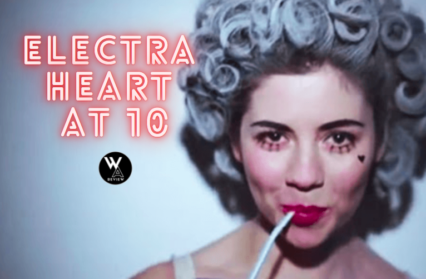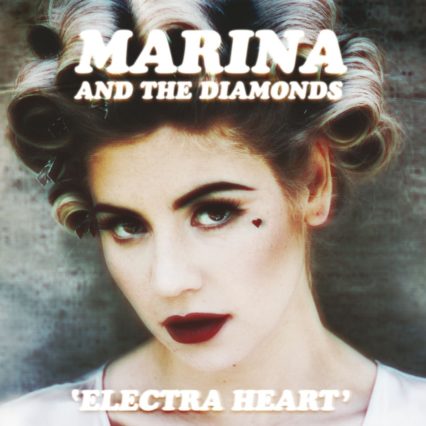Tilly Foulkes writes on Electra Heart 10 years on from its release, exploring exactly why this record from MARINA (then Marina and the Diamonds), meant so much to a generation of teenage girls who were enamoured with its glitzy world of sleaze and melodrama.
I was hesitant to listen to Electra Heart again. It’s an album reserved only for acute crises – moments I’d rather forget. The torture of falling in love, the muddled emptiness following my abandoning of university, the realisation I needed to leave someone I loved dearly because they did nothing but break my heart over and over again. I don’t listen with ease. It’s only played when I need to experience primal, unfiltered, excessive emotion – the freedom to be absolutely and unashamedly emotionally unhinged.
MARINA’s alter ego Electra is a hellish manifestation of pop culture, the American Dream and late-stage capitalism. A housewife, a homewrecker and a hollowed-out teen all stuffed into the outrageous, hyper-feminine caricature of a 21st century pop star – the perfectly produced pop only emphasises the life that falls apart within it. She tries to define herself through her hopeless relationships with men, which are all marked by unsteady power games, consistently resulting in her feeling emptier than before. Each song oscillates between grandiose self-concept and a gut-wrenching emptiness that she is almost pathetically desperate to fill. The songs are full of distorted, dishonest assertions of a self-love the character clearly doesn’t feel – instead it’s obvious she is trying to fill herself up because she feels void of anything solid.
These feelings of being inherently lacking are why it resonated so deeply with me as a teenager. Whether MARINA intended to or not, she created the perfect representation of girlhood in the 2010s. With Tumblr a landfill of ‘thinspo’ and Instagram a breeding ground of self-esteem issues, spearheaded by flat-tummy-tea selling influencers wreaking havoc with their polished and profitable false bodies, teenage girls were – and still are – constantly told what and who to be. But they can never, ever get it right: there’s always another step they must take to reach this undefinable goal. We’re fed a multitude of conflicting messages, but the overriding idea is that we will always be doing something wrong. At fifteen, I thought ‘Teen Idle’ – a slow, gritty song about the washed up-ness of youth – really defined my existence. I hadn’t even experienced youth, really – the most interesting thing I’d done was get pissed down the river on two cans of Strongbow Dark Fruits. But I did feel washed up, and I was already haunted by a bottomless sense of regret. It felt as though I’d failed a mysterious and ambiguous task before I’d even begun.
So to fill this void and attempt to define ourselves, we consume. MARINA got this: Electra Heart, with its varied influences and expensive sound, is as much about overindulgence as it is about love. Teen girls build their identity through culture – in the 2010s, this culture was consumed through Tumblr. The type of teenage girls that spent their time reblogging images of underweight women with bruised knees and bloody noses instead of leaving the house or going to bed were bored and lost. Pretty pictures and poetic quotes were an easy escape, but your blog was also an opportunity to cultivate a sturdy self-image. It’s no wonder Electra Heart was popular on there – it scrutinised the issues that were affecting the type of girls that were drawn to the site.
Brazenly feminine, sex-positive and profoundly emotional, the album celebrated the bedlam of girlhood, rather than shamed us for it. Did we understand it was satire? Of course not! We were young, and all that mattered was that it felt real, and that was empowering. The melodrama, the excessiveness, and the specific worries that permeated the album were an honest look at the inside of my teenage head. And Electra wasn’t ashamed of it – she wore her heart on her cheek. She may have hidden her emotions from the men that affected them, but we were in on the secret; inside her little world. And it looked exactly like ours.
Electra Heart was supposed to be a hilarious commentary on the state of pop culture under capitalism – a deconstruction of fame and excess, and the vacuous people who uphold those ideas and impose them upon the rest of us. And with hindsight, that’s exactly what it is. But once art is out in the world it takes on a life of its own, and, much like Electra, is redefined by every person who interprets it. That is its beauty, and its purpose: it helps to define the private and personal meaning of our lives. That’s why Tumblr was so great – we grew to understand our views of the world through art, photography, music and literature we wouldn’t have otherwise had access to. Culture is key as we try to outline ourselves, to learn more about who we are.
Teenage girls are shamed, mocked and underestimated, but their influence on culture is undeniable. They’re the leading purveyors of what will go on to be popular, and have a long-lasting impact. They’re messy, unreasonable, desperate – perplexed by the world, and their role within it. Electra Heart accentuated every aspect of that experience with empowering indifference. MARINA made something that – inexplicably – belonged to us, when it felt as though nothing ever did.













